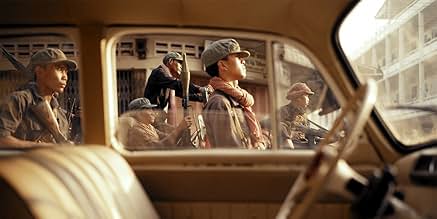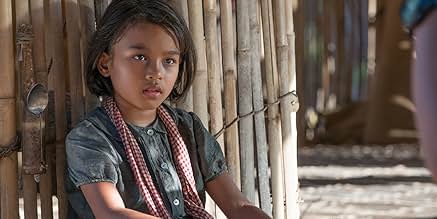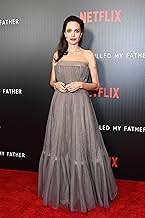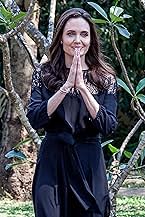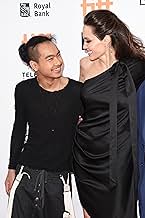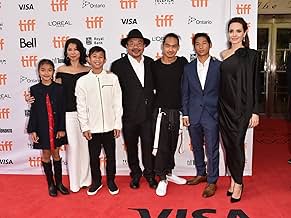Die kambodschanische Autorin und Menschenrechtsaktivistin Loung Ung berichtet von den Schrecken, die sie als Kind unter der Herrschaft der tödlichen Roten Khmer erlitten hat.Die kambodschanische Autorin und Menschenrechtsaktivistin Loung Ung berichtet von den Schrecken, die sie als Kind unter der Herrschaft der tödlichen Roten Khmer erlitten hat.Die kambodschanische Autorin und Menschenrechtsaktivistin Loung Ung berichtet von den Schrecken, die sie als Kind unter der Herrschaft der tödlichen Roten Khmer erlitten hat.
- Nominiert für 1 BAFTA Award
- 9 Gewinne & 29 Nominierungen insgesamt
- Self
- (Archivfilmmaterial)
- Self
- (Archivfilmmaterial)
Handlung
WUSSTEST DU SCHON:
- WissenswertesBased on the deadly rule of the Khmer Rouge, a communist inspired movement led by the dictator Pol Pot, under which an estimated 25% of the Cambodian population died from malnutrition, forced labour and mass murder from 1975 until 1979. This historical event is today known as the Cambodian genocide.
- PatzerFrom 1975 to 1979, people had only skin cover their bone due to heavily overwork and starvation. Most of the scenes from movie show people still healthy with no lack of food or nutrient.
- Zitate
[first lines]
Richard Nixon: [on broadcast TV] Cambodia, a small country of 7 million people, has been a neutral nation since the Geneva agreement of 1954. American policy since then has been to scrupulously respect the neutrality of the Cambodian people.
British Reporter: [standing with troops] The Vietnamese armies on the south side of the river appear to be indifferent to the contest.
Cambodian Politician: Under the pretext that there is a war necessity, they come into Cambodia.
Field Reporter: Are you glad to be in Cambodia?
Soldier: Negative. No.
Radio Reporter: The principle casualties appear to be innocent Cambodians.
Henry Kissinger: [at podium] ... the occasional difficulties in reaching a final solution.
Richard Nixon: What we are doing is to help the Cambodians help themselves. This is *not* an invasion of Cambodia.
French Reporter: The Nixon Doctrine for Southeast Asia appears to have failed. The war that began in Vietnam has now engulfed Cambodia. There is anger and frustration at the US bombings. Thousands of lives lost. Farms and livelihoods destroyed.
- VerbindungenFeatured in 75th Golden Globe Awards (2018)
GRADE: B
THIS FILM IS RECOMMENDED.
IN BRIEF: An impressive film that authentically addresses the subject of war and, despite some missteps, builds to a powerful conclusion.
SYNOPSIS: The true story of a young Cambodian child forced to survive during the Khmer Rouge uprising.
JIM'S REVIEW: Opening this weekend, and streaming on Netflix, is Angelina Jolie's powerful docudrama, First They Killed My Father (subtitled A Daughter of Cambodia Remembers), a film that shows war through the eyes of a five year old child. One can readily admire the fortitude and devotion that this actress / director applies to her film. It is a sad and harrowing tale that occurs too often in this violent world of ours. With little dialog, the film tells the compelling tale of Loung Ung (Sareum Srey Moch, making an impressive debut) as she overcomes oppression in order to survive. Using all Cambodian actors speaking their native language, Ms. Jolie wrote the screenplay, along with the author, and she relies on strong visuals to reveal the escalating tensions that once destroyed a small nation.
The basic story is involving and realistically viewed, but the movie unfolds at a sluggish pace, especially in the first half hour with too many scenes focusing on the hardships occurring before the actual titled event even happens off-screen. We watch our heroine forced to become a prisoner in an internment camp, along with her family, before becoming a child soldier. Yet the historical aspects of the story are rarely addressed for any moviegoers who may not know the backstory of the rise of the Khmer Rouge regime and the genocide and enslavement that followed in mid-70's Cambodia. (Approximately two million Cambodians were killed due to warfare, starvation, and forced labor.) We see the various happenings that endanger this child and her family but we are also trying to sort out and unravel these sudden and abrupt changes to their everyday existence, mainly through the photo-journalistic approach to the narrative rather than understand the words spoken.
Loung Ung's autobiographical memoir about her family becoming casualties of war is told honestly, if a bit one-sided, with the director's sometimes heavy-handed treatment of the Vietnam War and her humanitarian leanings interfering with the film's momentum. There are flashbacks and dream fantasies that simply get in the way of the basic compelling story. Judicious editing would have given the film even more impact.
Ms. Jolie's direction starts off shaky and uneven. Her film is wildly accurate and hyper-realistic at times and yet languid and tedious in its details in other moments. Using her "Sympathy to the Devil" opening montage with archival newsreel footage and scenes of American involvement in the War Without a Name is a class in Cliché Filmmaking 101. She introduces Ms. Ung's family with their wealthy privileged lifestyle due to her father governmental job and their happy home before slowly beginning to contrast the "then and now" aspects of the family's ordeal. Soon they and thousand of other sympathizers are exiled and put into camps and later being separated as a family unit.
Yet if one doesn't lose interest and continues on this journey, the film builds to an emotional conclusion. It is in the film's second half where Ms. Jolie delivers with many striking images (a tearful child clutching onto her long lost stuffed animal, a dead body washed ashore and seen by gaping children, child laborers being victimized and abused), All of these images resonate. Her direction is most effective in other scenes of violence and brutality, as in her climactic battle sequence involving land mines that is intensely filmed and riveting. (Special mention to Anthony Dod Mantle for his stunning cinematography.)
First They Killed My Father is ultimately an impassioned plea for unity, understanding, and empathy that tries and eventually succeeds as it asks us to remember the past. Ms. Jolie's reverent film serves as a lasting testament to the human spirit.
- jadepietro
- 18. Sept. 2017
- Permalink
Top-Auswahl
- How long is First They Killed My Father?Powered by Alexa
Details
- Erscheinungsdatum
- Herkunftsländer
- Offizieller Standort
- Sprachen
- Auch bekannt als
- First They Killed My Father
- Drehorte
- Produktionsfirmen
- Weitere beteiligte Unternehmen bei IMDbPro anzeigen
Box Office
- Budget
- 24.000.000 $ (geschätzt)
- Laufzeit2 Stunden 16 Minuten
- Farbe
- Sound-Mix
- Seitenverhältnis
- 1.85 : 1
Zu dieser Seite beitragen




